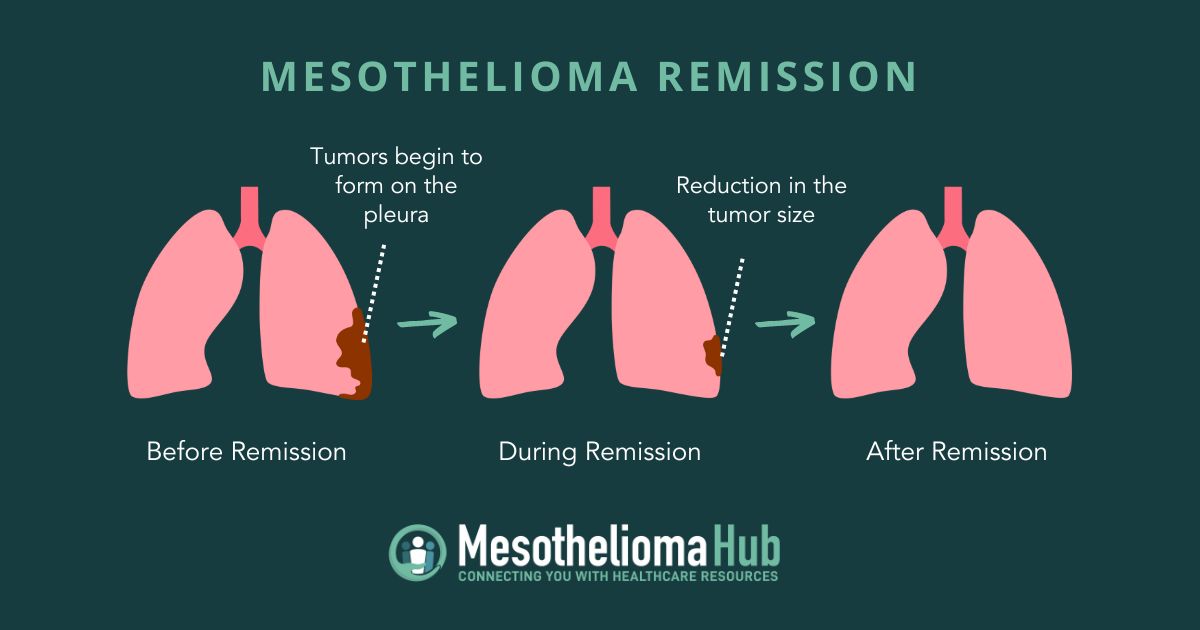Mesothelioma / Mesothelioma Remission and Recurrence
Mesothelioma Remission and Recurrence
Mesothelioma patients can reach remission, but it is extremely rare. By receiving proper treatment, some mesothelioma patients can reach complete or partial remission. Even after remission, patients should receive follow-up care to ensure cancer does not enter recurrence.
Get Free Mesothelioma Guide

Can Mesothelioma Go Into Remission?
If you are struggling with a mesothelioma diagnosis it’s natural to have pressing questions, and a common one is whether mesothelioma can go into remission. To clarify, being in remission signifies that medical professionals have observed a decrease or disappearance of cancer symptoms. In the context of mesothelioma, achieving remission is typically characterized by the absence of detectable disease, known as No Evidence of Disease (NED).
While mesothelioma going into remission is indeed possible, it remains an exceptionally rare occurrence. It is essential to grasp the potential for mesothelioma remission and to gain insights into the future trajectory of the diagnosis for you or your loved one when confronted with this challenging disease.
Mesothelioma Treatment’s Role in Remission
Statistics have proven that treatment is the most effective way you could improve your prognosis. A 2015 study stated that mesothelioma cancer patients who received therapies had a 92% 1-year survival rate, a 74% 3-year survival rate, and a 39% 10-year survival rate, respectively.
On the other hand, not receiving treatment can negatively influence the life expectancy of mesothelioma patients. There are several reasons patients may not undergo treatment such as the cost of treatment, a late-stage diagnosis, and physical ability. Palliative care is an excellent way to relieve cancer side effects and create comfort. Common palliative treatments are nutritional supplements, pain medication, meditation, and massages.
Mesothelioma Remission Types Stages
You can get rid of mesothelioma through rigorous cancer treatment. Primary treatment options for mesothelioma include surgery, hormone therapy, chemotherapy, and radiation. However, there are several emerging forms of cancer treatment in some of the nation’s top medical centers such as targeted therapy medications, complementary therapies, and immunotherapy. These therapies can help cancer patients better reach remission.
Acknowledging the distinct nature of each mesothelioma case, healthcare professionals customize treatment plans to precisely meet the individual needs and circumstances of the patient. The formulation of personalized treatment strategies considers variables such as the stage of mesothelioma, the patient’s overall health, and the presence of any underlying conditions. This tailored approach is designed to maximize the efficacy of treatment, enhancing the chances of attaining remission and ultimately contributing to an improved quality of life for individuals contending with mesothelioma.
Partial Remission Cancer
Partial remission in cancer refers to a state where there is a significant reduction in the size or extent of tumors, but not a complete disappearance of all cancer cells. This intermediate stage signifies a positive response to treatment, with a notable improvement in the patient’s condition. However, it’s important to note that partial remission does not imply a cure, and ongoing medical monitoring and treatment are usually necessary to manage the disease and prevent its progression.
Partial remission is often assessed through medical imaging, such as CT scans or MRIs, which can reveal the reduction in tumor size and activity. The degree of partial remission can vary, and medical professionals closely monitor patients to determine the effectiveness of the treatment regimen. In many cases, the goal of partial remission is to enhance the patient’s quality of life by controlling the cancer’s growth and minimizing symptoms.
Full Mesothelioma Remission
Although there is no cure for mesothelioma, many people can reach full mesothelioma remission. Full remission, also known as complete remission, means that tests, exams, and scans, indicate that all signs of cancer are gone. Some mesothelioma doctors also refer to full remissions as “cancer free” or “no evidence of disease (NED).” Many believe that complete remission means that the cancer is cured; however, remission simply indicates that there is no longer evidence of cancer in the body. After reaching full remission, cancer patients will no longer need treatment unless signs of cancer return. During remission, patients can begin their life after mesothelioma.
Partial Mesothelioma Remission
In the context of partial mesothelioma remission, it signifies that while cancer persists in the body, there has been a reduction in tumor size or a decrease in the overall cancer presence. Individuals experiencing partial remission may have the opportunity to pause cancer treatment, provided that the cancer does not exhibit signs of regrowth. The criteria for considering a patient in remission require observable tumor shrinkage sustained for at least one month. This nuanced understanding of partial remission underscores the dynamic nature of mesothelioma management and the importance of ongoing monitoring.
What Is Mesothelioma Recurrence?
After receiving treatment or reaching remission, your team of medical professionals should continue to check for signs of cancer and other health issues. Even if you are in remission and have no mesothelioma symptoms, you should continue to receive care such as imaging tests, checkups, and blood tests.
Recurrence is the opposite of remission cancer; medical professionals refer to cancer as recurrent when cancer comes back after remission. Some cancer cells remain in the body, unnoticed, for several years after treatment and remission. Recurrence can occur locally, in the same place it started, or distantly, meaning cancer comes back in a different place in the body. Mesothelioma can come back after initial treatment and the recurrence may need further treatment from a mesothelioma specialist.
Are There Any Survivors of Mesothelioma?
The typical survival rate for mesothelioma is typically 4-18 months after learning of a diagnosis, however, people have lived for much longer that that. The current five-year survival rate, meaning the percentage of people who lived at least 5 years, is only 10%. Although there is no cure for mesothelioma, many people can survive with mesothelioma. There are also mesothelioma patients that have reached remission and have become survivors of mesothelioma.
Mesothelioma Hub understands the confusion of a mesothelioma diagnosis and all that comes alongside it. If you want to understand more about your mesothelioma prognosis and remission, we can provide information. For further details about mesothelioma and the possibility of remission, download our mesothelioma guide or receive your free mesothelioma case evaluation.
Mesothelioma Support Team
Mesothelioma Hub is dedicated to helping you find information, support, and advice. Reach out any time!

